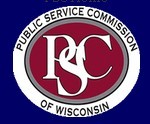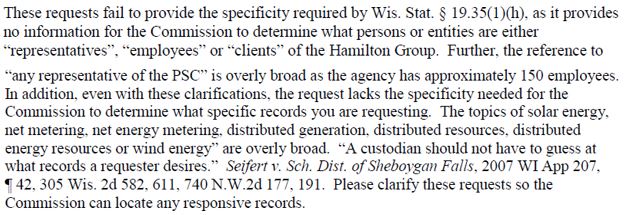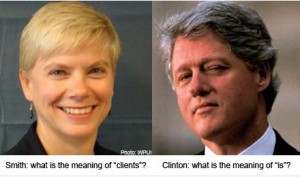Part Three in a Series
The Wisconsin Public Service Commission (PSCW) has agreed to fulfill our request for the release of records surrounding a powerful former staff member’s communications with the clients and lobbyists from the lobbying firm he joined right after he left the Commission. It took the PSCW three and a half months to agree – but not before the Commission’s top attorney claimed not to know the meaning of common words, including “representatives,” “employees,” or “clients.”
Pirlot’s World
 Until December 2014, Randall “R.J.” Pirlot was the PSCW’s influential chief operating officer and executive assistant to then-PSCW Chairman Phil Montgomery. Pilot was in his powerful staff position when many of the pro-utilities, anti-clean energy decisions by the PSCW were written.
Until December 2014, Randall “R.J.” Pirlot was the PSCW’s influential chief operating officer and executive assistant to then-PSCW Chairman Phil Montgomery. Pilot was in his powerful staff position when many of the pro-utilities, anti-clean energy decisions by the PSCW were written.
We submitted a request for the records of Pirlot’s communications with the clients and staff of his current lobbying firm, the Madison-based Hamilton Consulting Group on November 4, 2015. The Hamilton Group lobbies for several pro-utility, anti-clean energy interests with business before the Commission at which he used to work.
Two weeks after filing the initial request, we received a letter from Commission General Counsel Cynthia Smith that the PSCW had “initiated a process and will respond to your request as soon as practicable,” then went on to question the meaning of several, ordinary words.
In our records request, we asked for:
- All records containing and/or regarding communications and/or meetings about solar energy, net metering, net energy metering, distributed generation, distributed resources, distributed energy resources or wind energy between R.J. Pirlot and any representative of the Hamilton Group while executive assistant to former Chairman Phil Montgomery of the Public Service Commission (PSCW) of Wisconsin.
- Any records containing and/or regarding communications and/or meetings between R.J. Pirlot with any representative of the PSCW that concern the Hamilton Group, its employees and/or any of its lobbying clients that relate to solar energy, net metering, net energy metering, distributed generation, distributed resources, distributed energy resources or wind energy.
The Wisconsin Public Service Commission
 Despite a surge in demand for clean energy savings by major corporations and governments, Wisconsin’s Public Utilities Commission has doubled-down on fossil fuel energy. It also has dramatically increased monthly fixed charges for homeowners – a method recommended by the utility industry’s lobbying arm, the Edison Electric Institute, to beat back residential solar.
Despite a surge in demand for clean energy savings by major corporations and governments, Wisconsin’s Public Utilities Commission has doubled-down on fossil fuel energy. It also has dramatically increased monthly fixed charges for homeowners – a method recommended by the utility industry’s lobbying arm, the Edison Electric Institute, to beat back residential solar.
As we have written previously, executive assistants to commissioners in Wisconsin are powerful officials, exempt from ex parte rules – meaning they can talk to lobbyists at any time and not have to report those communications with the parties in a contested case before the Commission.
Pirlot Becomes a Hamilton Lobbyist
 A month after leaving the PSCW, Mr. Pirlot was hired as a lobbyist for the Hamilton Consulting Group. The firm’s clients include the utility Xcel Energy, which was granted a 75% increase in its monthly fixed rate customer charge on December 3, 2015; and Wisconsin Manufacturers & Commerce, a business lobbying organization that has firmly supported utilities.
A month after leaving the PSCW, Mr. Pirlot was hired as a lobbyist for the Hamilton Consulting Group. The firm’s clients include the utility Xcel Energy, which was granted a 75% increase in its monthly fixed rate customer charge on December 3, 2015; and Wisconsin Manufacturers & Commerce, a business lobbying organization that has firmly supported utilities.
Hamilton and Xcel Energy
Xcel Energy has reported lobbying in “support for confirmation of appointment for Ellen Nowak as Commissioner of the PSC” and on “the appointment of current Commissioner Mike Huebsch.” Additionally, Xcel reported lobbying on numerous measures against solar and renewable energy including:
- any proposal relating to distributed generation, third-party ownership or net metering;
- proposals relating to energy efficiency and renewable fuels;
- bills related to the use of renewable resource credits called for by renewable portfolio standards; and
- authorization of the Public Service Commission to approve temporary electric rates to promote economic development.
Wisconsin law bars state public officials, except for legislators and their staff members, from representing clients in a formal capacity before their former departments and offices for one year after leaving public service. We note that Pirlot waited until the one-year period expired to formally register as an Xcel lobbyist.
Hamilton Group and Koch
Koch Industries International have a significant presence in Wisconsin, and they have been aggressive nationwide in trying to undermine clean energy policies (as seen HERE and HERE and HERE). Koch Companies Public Sector, the lobbying arm of Koch Industries, is a client of Hamilton Group, which has deployed at least three registered lobbyists representing the company since 2009.
Managing Partner Robert Fassbender, as well as Principals Rebecca Hogan and Andrew Engel, represent “the various Koch Industries, Inc. companies on public affairs matters, including Flint Hills Resources, LP, an energy purchaser and refiner & transporter of petroleum.” Hamilton employees lobbied on “Legislation and rules relating to the environment, energy, taxation, business, policy and other areas affecting Koch Industries, Inc. companies.”
Dictionary Needed?
We thought our records request was pretty straightforward. But the Wisconsin Public Service Commission’s General Counsel Cynthia Smith responded by saying that it didn’t have enough information from us about who Hamilton Group’s lobbyists, clients, or employees would be.
To repeat that: A leading attorney was saying she didn’t know how to tell what a “client” was, though Hamilton Group lists its clients on its website – and Pirlot’s communications with Hamilton group employees could be easily searched by firm name or email domain.
General Counsel Smith wrote:

Checks and Balances Project’s Wisconsin attorney, April Barker of Shott, Bublitz & Engle, responded to Ms. Smith on December 16, 2015, to advise her that “if it appears that an authority deliberately feigns ignorance of commonly understood words, this may be submitted in eventual legal proceedings as evidence of an arbitrary and capricious refusal to produce records….”
In a spirit of compromise, we offered to reduce the time period of our original request from three-plus years to one year. Ms. Barker sent a second letter on February 2, 2016, reminding Smith that we had not heard from her.
The Wisconsin legislature has mandated that “a representative government is dependent on an informed electorate” and it is “the public policy of this state that all persons are entitled to the greatest possible information regarding the affairs of government and the official acts of those officers and employees who represent them.” Wisconsin Statute further declares that it is an integral part of the routine duties of officers and employees whose responsibility it is to provide such information…. The denial of public access generally is contrary to the public interest.”
While not quite a “symphony ticket” excuse from Arizona Commissioner Bob Stump, this semantic gamesmanship does the Wisconsin Public Service Commission no favors. The questions about Pirlot are straightforward, fair, and must be legally honored. We hope the Commission’s response to our request is complete. Drawing out the process with word games and feigned ignorance only heightens the attention the records will eventually receive by the public.
Scott Peterson is executive director of the Checks and Balances Project, a national watchdog blog that seeks to hold government officials, lobbyists and corporate management accountable to the public. Funding for C&BP comes from pro-clean energy philanthropies and donors.







Recent Comments